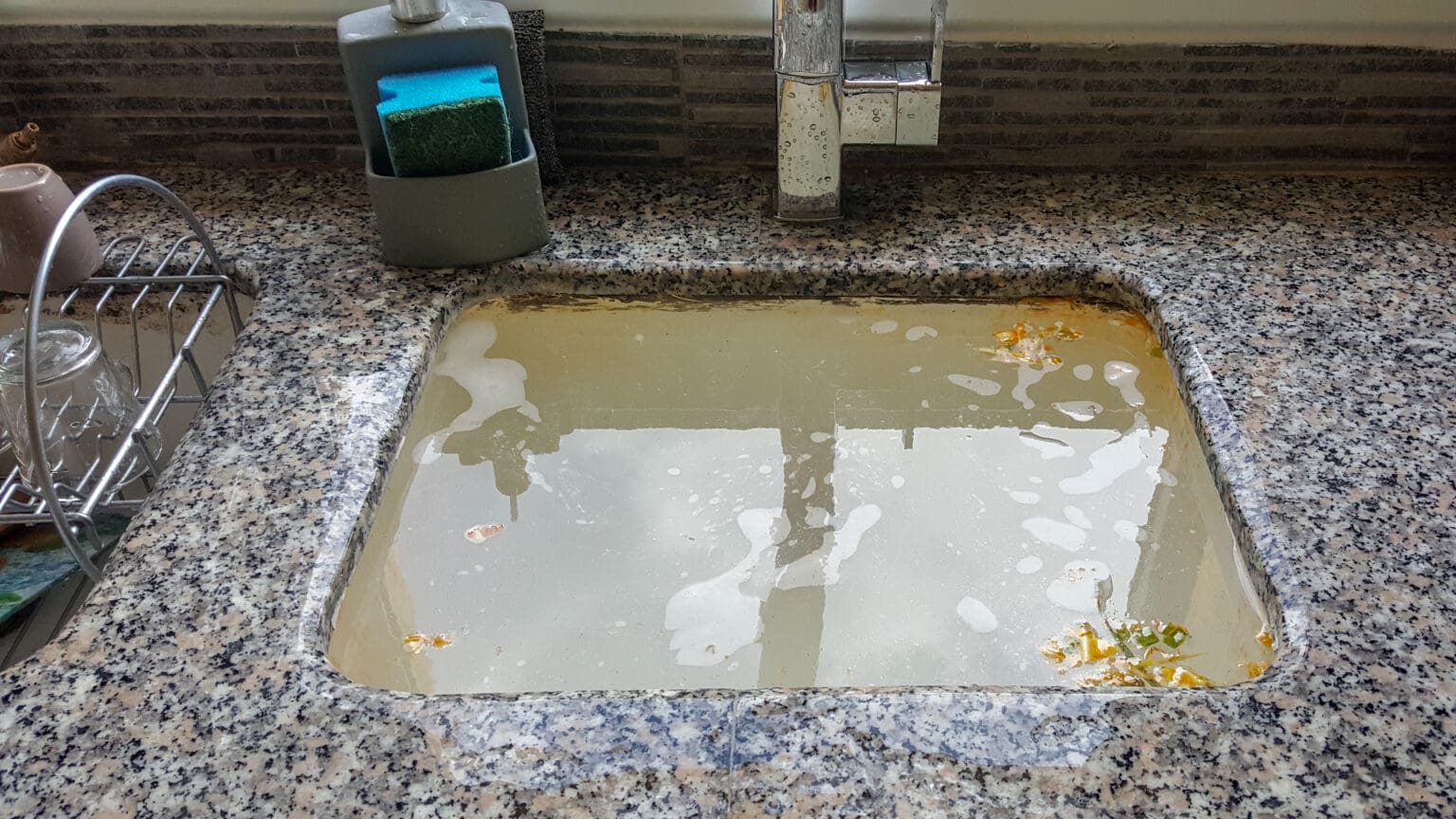What You’ll Learn
As you read about how to unclog a kitchen sink, you’ll learn:
- There are some things that should never go down a garbage disposal.
- The garbage disposal can actually make it more popular to reach into the drain and address clogs when you have standing water.
- Greasy clogs are one of the most common causes of stagnant water from a clogged kitchen sink.
Why Kitchen Sink Clogs Happen in the First Place
The biggest reason kitchen sinks clog is because cooking oil, grease, and fat can cling to the sides of your drain. These thick, sticky substances eventually collect even more materials, such as soap scum, gobs of detergent, and food particles. Eventually, these buildups get so severe that you end up with stagnant water, and you’re left wondering how to unclog a kitchen sink.
Ways to Unclog Your Kitchen Sink
The best method for unclogging a sink will depend somewhat on the type and severity of the clog, and it may even vary depending on the type of drain. Still, there are multiple tips and tricks for people who are learning how to unclog a kitchen sink. Here are seven of the top ideas that will get your sink working again:
- Use boiling water. As mentioned above, grease and soap residue are some of the most common things that clog your sink, and hot water can help melt them enough to release the blockage. This is a good place to start your efforts because it is so quick, easy, and simple. First, start boiling water in an electric kettle or on the stove. You don’t need very much water– a gallon or even a half of a gallon might do the trick. Once the water has reached its boiling point, pour it slowly into the drain opening. Make sure you don’t splash it around or do anything else that could burn you. Turn on the faucet when you’re finished to see if the water drains how it should.
- Check the disposal. Since the kitchen sink normally has garbage disposal built into it, it is important to check as you figure out how to unclog a kitchen sink. Try running the disposal to see if that will break down whatever is clogging your sink. At this point, it’s important to note that you should never run your disposal dry. A steady stream of cold water will help keep everything running smoothly. If your disposal isn’t running properly, you may need to replace it or reboot it by flipping the switch on its side or bottom. Never stick your hand down into the disposal. If you absolutely must stick something into the disposal to break up a clog, try an Allen wrench or something similar.
- Try a plunger. If the disposal isn’t the problem, you may be able to clear the blockage with a plunger. We recommend against using a toilet plunger in your sink for two key reasons. First, if the plunger has been used before, it shouldn’t be coming in contact with your kitchen sink. Second, a flat-bottomed plunger is actually better for this job anyway. Fill the sink up a little bit with hot water and plunge away.
- Use a natural drain cleaner. Most experienced plumbers will warn you about the potential dangers of using chemical drain cleaners. The harsh chemicals can corrode the materials in your drains and pipes, leading to even bigger problems. Instead, pour one cup of baking soda down your drain, then follow it with one cup of white vinegar. At this point, you can place a stopper over the drain to seal it and force the pressure downwards. Let it stand for 15 minutes, then run hot water to rinse and see if the water drains properly.
- Use a plumber’s snake. If you have a plumber’s snake, this is a good time to get it out. Feed it down into the drain until you can feel the blockage, then start cranking to see if you can dislodge the clog. Just be careful not to accidentally push the clog further into your drain, which will only make it harder to clear. Some people might be tempted to use a makeshift plumber’s snake made of a wire hanger, but we generally recommend against this. It could potentially push the clog further down or be bad for your pipes.
- Check the P-trap. The pipe under your sink has a bend called the P-trap. This is designed to help catch anything that might accidentally fall into the sink, such as a ring. Unfortunately, it can also catch other things it isn’t supposed to catch, which leads to a clog. You’ll have to take the pipe off to clean it, so be prepared to handle a little bit of mess. You’ll need gloves, towels, a bucket, some tools, and a few handy skills. Don’t try something like this if you aren’t comfortable with your ability to take the sink apart and put it back together again.
- Call an experienced plumber. This is absolutely the safest, surest, easiest way to unclog a kitchen sink. It will save you time and prevent many of the headaches that come from trying to figure out how to unclog a kitchen sink by yourself. It’s also good to have a professional involved when it becomes necessary to get into your pipes or even disassemble parts of the sink. These kinds of tasks have to be performed correctly, or you could just end up causing much larger problems.
Tips for Preventing Clogs
If you’ve ever had to unclog a kitchen sink before, you already know it’s far better to just prevent those types of problems in the first place. Here are four different ways you can help avoid sink blockages:
- Dispose of coffee grounds elsewhere. These are bad for the sink, so just throw them away, compost them, or add them to your garden. Sinks may hate them, but plants love them!
- Keep grease, fat, and oil out of the sink whenever possible. You’re likely to get a little bit in when cleaning dishes, but you should always pour off as much as possible into a disposable container that you can throw away later.
- Know the other foods to avoid, too. For example, rice expands in water. Eggshells, celery, pasta, flour, fruit seeds (including chia seeds), and asparagus, among other things, can all contribute to clogs.
- Get preventative maintenance often from an experienced plumber. This will help you address problems early before they cause clogs.
When in Doubt, Call Day & Night Air Conditioning, Heating & Plumbing in Phoenix
A clogged kitchen sink can really disrupt the flow of your life and make your home a lot less of a pleasant place to be. If you can’t determine how to unclog a kitchen sink quickly, call Day & Night Air Conditioning, Heating & Plumbing to receive prompt assistance. As your Phoenix-based plumbing company, we have been helping residents of Maricopa County unclog their sinks for a long time. We’re prepared to tackle all kinds of different issues and find a way to unclog any sink because we’re a full-service drain company. Schedule online at your convenience.
Featured Image: Andrey_Popov/Shutterstock







